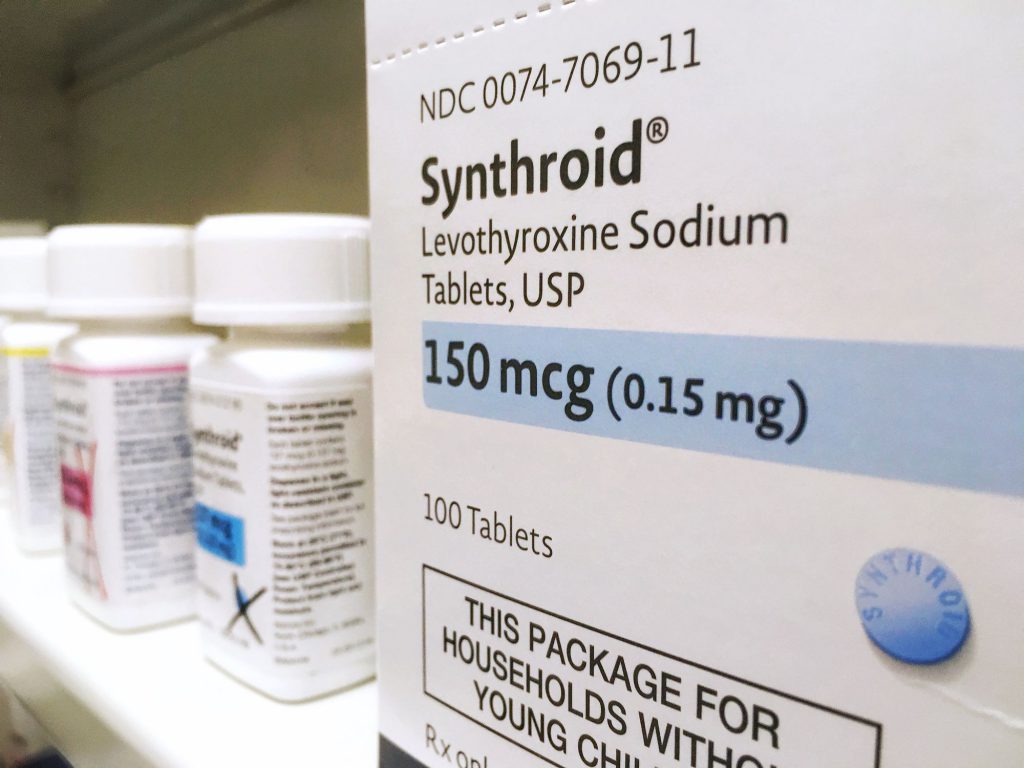Synthroid Levothyroxine Sodium T4 Sale
Synthroid (Levothyroxine) is a thyroid hormone supplement that is used to treat people who do not produce enough thyroid hormone on their own. Levothyroxine replaces the hormone that is normally produced by your thyroid gland to regulate the body’s energy and metabolism. Synthroid is also used to treat and prevent goiter (enlarged thyroid gland) that is caused by hormone imbalances, radiation treatment, surgery or cancer. Levothyroxine should not be used to treat infertility unless it is caused by low thyroid hormone levels. It may take several weeks for this medication to have a noticeable effect on your condition.
What are the Possible Side Effects of Synthroid?
See your doctor right away if any of these rare but serious side effects of high thyroid hormone levels occur such as chest pain, fast, pounding or irregular heartbeat, seizures, swelling hands, ankles and feet. Inform your doctor if any of these unlikely but serious side effects of high thyroid hormone occur:
• Diarrhea;
• Headache;
• Increased sweating;
• Mental or mood changes;
• Shaking (tremor);
• Shortness of breath;
• Tiredness
Are there any Precautions or Drug Interactions for Synthroid?
You should not use Synthroid if you are allergic to Levothyroxine or if you have any other allergies. Before you start using this medication, inform your doctor or pharmacist about your medical history especially if you have increased thyroid hormones, decreased adrenal gland function, heart disease, high blood pressure or diabetes. This medication can be used during pregnancy but inform your doctor if you are pregnant because your dose may need to be adjusted. Levothyroxine passes into breast milk but is unlikely to harm a nursing infant.
Synthroid Safety and Storage Information
Synthroid tablets should be stored between 68 and 77 degrees F (20 and 25 degrees C) away from heat, light and moisture and out of the reach of children and pets. This medication should not be stored in the bathroom.
Synthroid Levothyroxine Sodium T4 More info
Comparing Synthroid to Natural Thyroid: Their controlled study compared natural thyroid with Synthroid. What they found was that roughly half of the patients (48%) felt better on the natural thyroid, one-third had no preference, and one-fifth (18.6%) felt better on the Synthroid. Clearly the natural thyroid wins the comparison test (48.6% vs. 18.6%).
Take this medication by mouth as directed by your doctor, usually once daily on an empty stomach, 30 minutes to 1 hour before breakfast. Take this medication with a full glass of water unless your doctor directs you otherwise.
If you are taking the capsule form of this medication, swallow it whole. Do not split, crush, or chew. People who cannot swallow the capsule whole (such as infants or small children) should use the tablet form of the medication.
For infants or children who cannot swallow whole tablets, crush the tablet and mix in 1 to 2 teaspoons (5 to 10 milliliters) of water, and give using a spoon or dropper right away. Do not prepare a supply in advance or mix the tablet in soy infant formula. Consult your pharmacist for more information.
Dosage is based on your age, weight, medical condition, laboratory test results, and response to treatment.
Use this medication regularly in order to get the most benefit from it. To help you remember, take it at the same time each day.
Do not stop taking this medication without first consulting with your doctor. Thyroid replacement treatment is usually taken for life.
There are different brands of levothyroxine available. Do not change brands without first consulting your doctor or pharmacist.
Certain medications (such as cholestyramine, colestipol, colesevelam, antacids, sucralfate, simethicone, iron, sodium polystyrene sulfonate, calcium supplements, orlistat, sevelamer, among others) can decrease the amount of thyroid hormone that is absorbed by your body. If you are taking any of these drugs, separate them from this medication by at least 4 hours.
Symptoms of low thyroid hormone levels include tiredness, muscle aches, constipation, dry skin, weight gain, slow heartbeat, or sensitivity to cold. Tell your doctor if your condition worsens or persists after several weeks of taking this medication.





